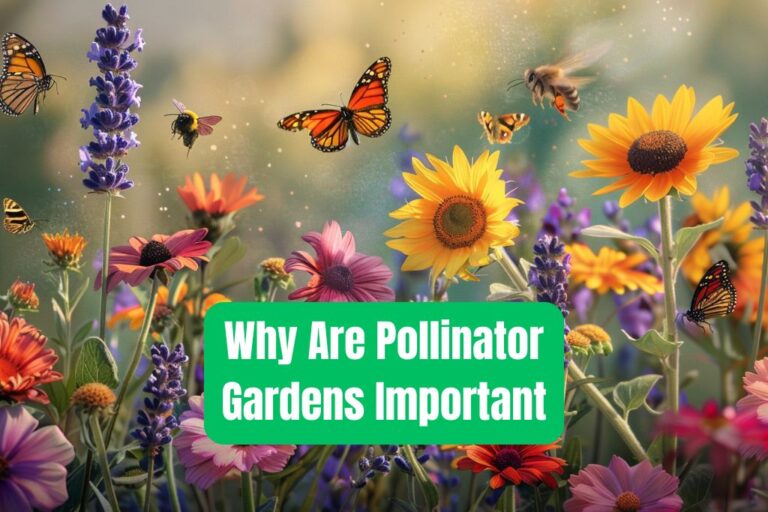Top 8 Mosquito Repellent Indoor Plants
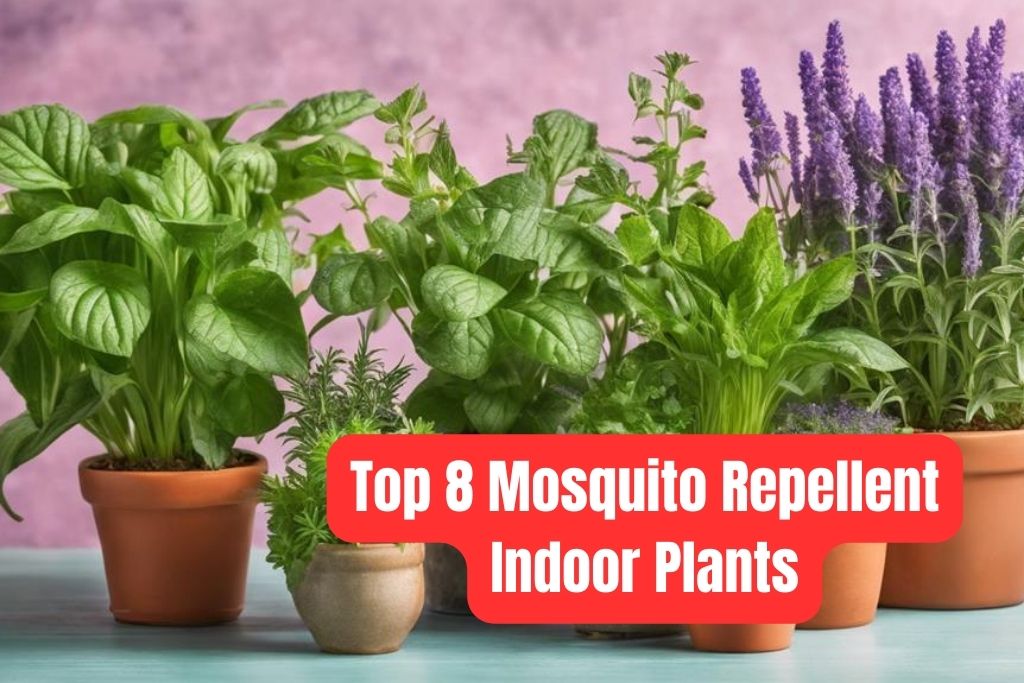
Want to keep pesky mosquitoes away naturally indoors? Try these top 8 mosquito repellent plants: Citronella with its strong scent, Lavender for beauty and effectiveness, Basil with its culinary and repellent properties, Mint for its versatile uses, Rosemary for an effective deterrent, Lemon Balm with its citrus scent, Marigold for added protection, and Catnip for strong repellent powers. These plants not only look great but also help keep mosquitoes at bay. Discover how these plants can enhance your indoor space with their mosquito-repelling qualities.
Citronella
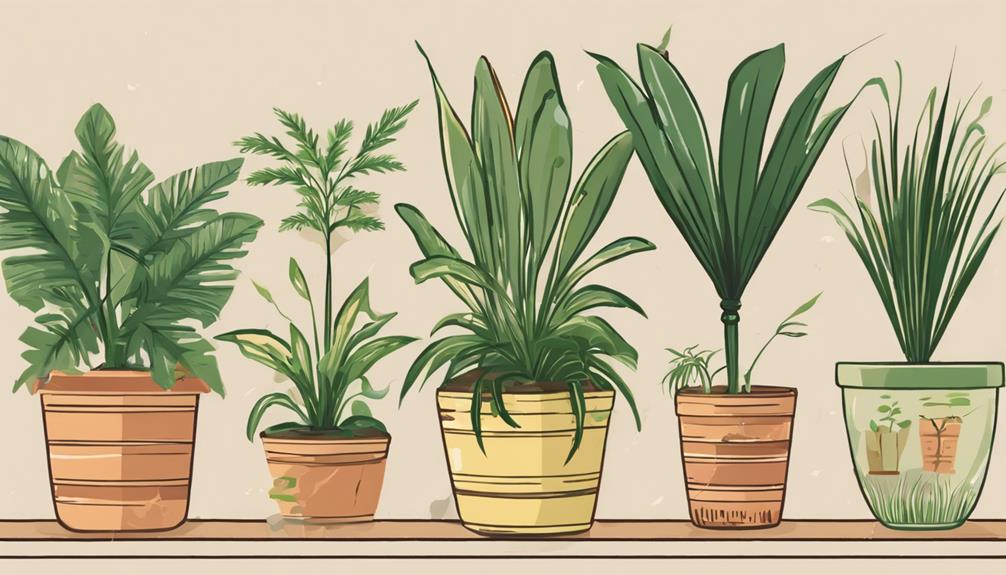
If you’re looking to repel mosquitoes indoors, consider planting citronella, a natural and effective solution. Citronella is well-known for its strong citrus scent that masks the odors that attract mosquitoes, making it an excellent choice for your indoor garden. This plant belongs to the geranium family and is easy to care for, thriving in pots or containers near windows or doors.
Citronella plants require plenty of sunlight, so make sure to place them in a sunny spot in your home. Regular watering is essential, ensuring the soil remains consistently moist but not waterlogged. You can also crush the leaves of the citronella plant to release more of its mosquito-repelling scent.
Consider placing citronella plants strategically around your living spaces to create a natural barrier against mosquitoes. Remember that while citronella is effective at repelling mosquitoes, it may not eliminate all of them. In combination with other preventive measures, such as screens on windows and doors, citronella can significantly reduce the mosquito population indoors.
Lavender

Consider planting lavender indoors to naturally repel mosquitoes with its delightful scent and proven effectiveness. Lavender not only adds a touch of beauty to your indoor space but also serves as a powerful mosquito repellent. This aromatic herb emits a fragrance that mosquitoes find repulsive, helping to keep them at bay.
In addition to its mosquito-repelling properties, lavender is easy to care for and thrives in indoor environments with plenty of sunlight. Its lovely purple flowers and soothing scent make it a popular choice for both aesthetic and practical reasons.
You can place pots of lavender near windows, doorways, or outdoor seating areas to create a natural barrier against mosquitoes.
To maximize lavender’s mosquito-repelling effects, consider crushing a few leaves to release more of its scent or adding dried lavender to potpourri. By incorporating lavender into your indoor garden, you can enjoy a mosquito-free environment while adding a touch of beauty and tranquility to your home.
Basil
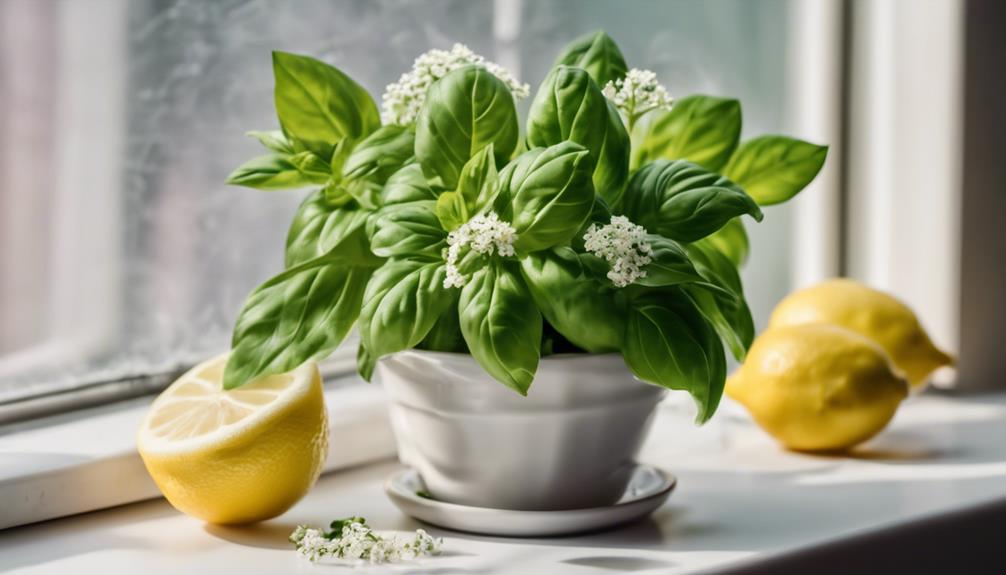
Planting basil indoors is a great way to naturally repel mosquitoes while also adding a fresh and aromatic herb to your living space. Basil not only serves as a wonderful addition to your culinary adventures but also acts as a natural mosquito repellent due to its strong scent that mosquitoes find unpleasant. You can place potted basil plants near entryways or open windows to help keep these pesky insects at bay.
Here is a table showcasing some key points about basil:
| Basil | Indoor Plant |
|---|---|
| Repels mosquitoes | Yes |
| Aromatic scent | Yes |
| Culinary uses | Yes |
| Sunlight needs | Bright, indirect light |
| Watering needs | Regularly, keep soil moist |
Mint
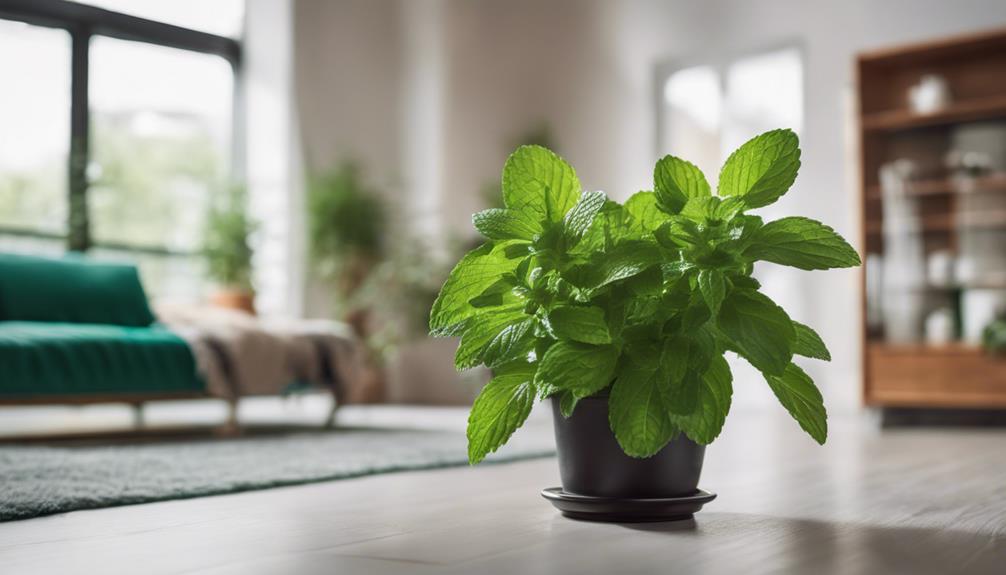
Plant mint indoors to naturally repel mosquitoes with its strong scent that deters these insects. Mint, with its refreshing aroma, acts as a powerful mosquito repellent. The scent of mint interferes with the mosquito’s ability to locate a host by masking the human scent that attracts them.
It contains natural oils that mosquitoes find extremely unpleasant, driving them away from your home.
Growing mint indoors is relatively easy as it thrives in pots with well-draining soil and plenty of sunlight. Regularly watering the plant and providing it with indirect sunlight will help it flourish and continue to ward off mosquitoes effectively.
Additionally, mint plants are versatile and can be used for culinary purposes, making them a practical and multi-functional addition to your indoor garden.
To benefit from mint’s mosquito-repelling properties, consider placing pots of mint in key areas around your home, such as near windows or entry points. Not only will you enjoy the fresh scent of mint indoors, but you’ll also create a natural barrier against pesky mosquitoes.
Rosemary
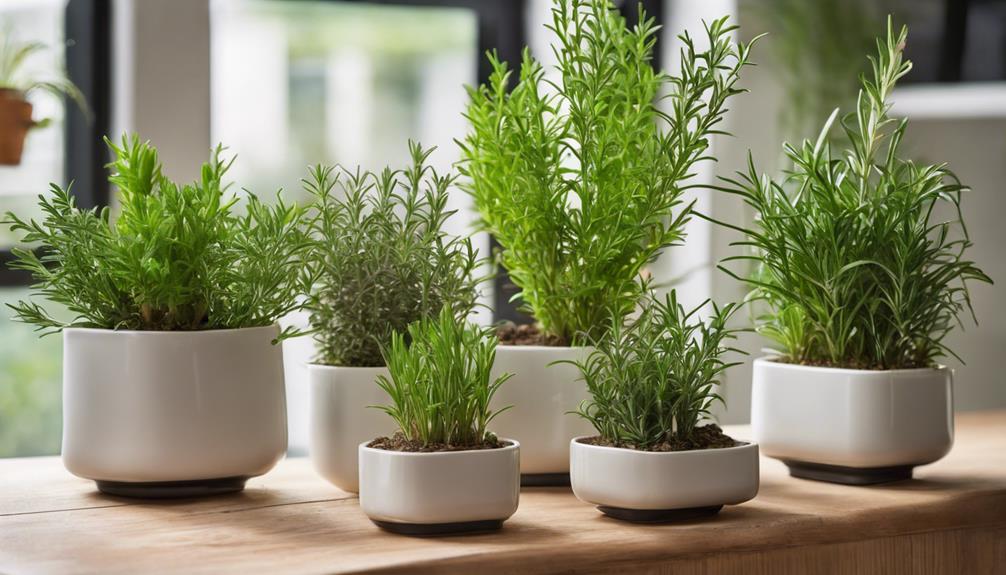
Indoor mosquito control can be further enhanced by introducing rosemary plants, which offer a natural deterrent against these insects with their potent aroma. Rosemary, a fragrant herb commonly used in cooking, contains oils that mosquitoes find repugnant. Placing rosemary plants strategically around your home can help keep these pesky insects at bay.
Growing rosemary indoors is relatively easy, requiring good sunlight and well-drained soil. This versatile plant can thrive in pots or hanging baskets, making it a practical and aesthetic choice for indoor mosquito repellent. Regular pruning not only helps the plant maintain its shape but also releases more of its distinctive scent, increasing its effectiveness in deterring mosquitoes.
To maximize the mosquito-repelling properties of rosemary, consider crushing a few leaves to release more of the plant’s oils. This can be particularly useful in areas where mosquitoes are prevalent.
With its dual functionality as a culinary herb and a natural insect repellent, rosemary is a valuable addition to any indoor garden seeking to combat mosquitoes.
Lemon Balm
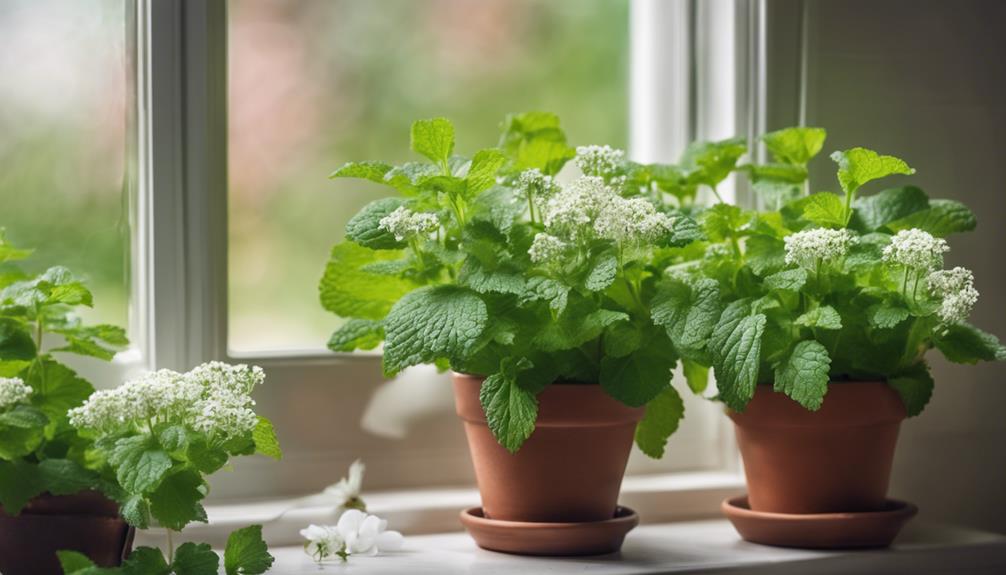
With its refreshing citrus scent, lemon balm serves as an effective mosquito repellent for indoor spaces. This plant, also known as Melissa officinalis, not only adds a pleasant aroma to your home but also helps keep pesky mosquitoes at bay. Lemon balm contains high levels of citronellal, a compound that mosquitoes find repugnant, making it a natural and non-toxic way to protect yourself from these insects.
To maximize the mosquito-repelling benefits of lemon balm, place potted plants near windows or doorways to create a barrier that deters mosquitoes from entering your living areas. You can also crush the leaves of the lemon balm plant to release more of its aromatic oils and enhance its repellent properties. Remember to rub the crushed leaves on your skin to act as a natural mosquito repellent when spending time outdoors.
In addition to its insect-repelling qualities, lemon balm is easy to care for and thrives in indoor environments with plenty of sunlight. By incorporating lemon balm into your indoor plant collection, you can enjoy a mosquito-free home while adding a touch of citrus freshness to your surroundings.
Marigold
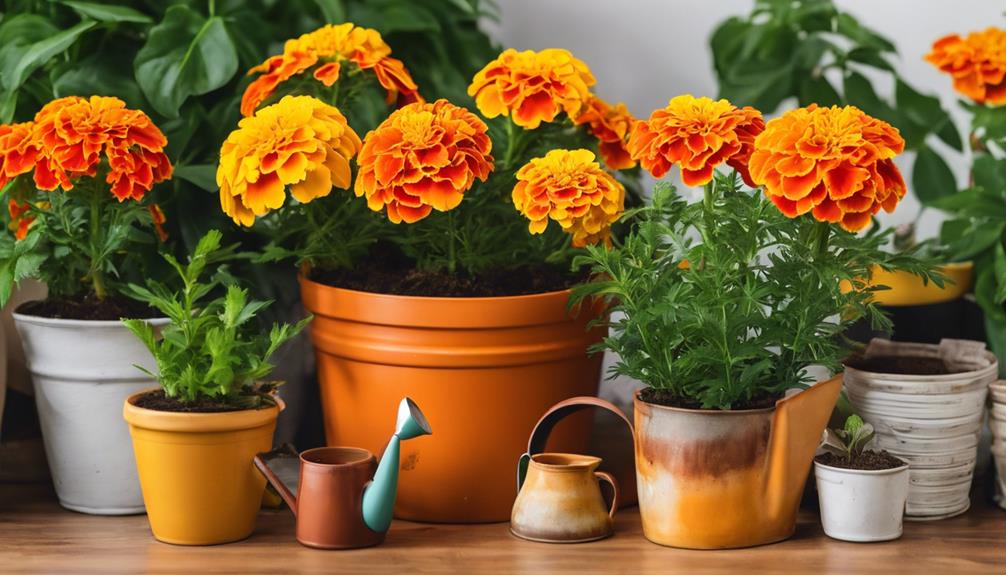
To naturally repel mosquitoes indoors, consider incorporating marigolds into your living space. Marigolds aren’t only beautiful additions to your home but also serve as a natural mosquito repellent. Here are some tips to make the most out of these vibrant plants:
- Plant Marigolds Near Entry Points: Place marigolds near windows, doors, or any other entry points to keep mosquitoes from entering your home.
- Crush the Leaves: By crushing the leaves of the marigold plant, you release their scent, which acts as a natural mosquito deterrent.
- Use Marigolds in Bouquets: Create bouquets using marigolds and place them around your home to maximize their mosquito-repelling properties.
- Combine with Other Repellent Plants: Consider combining marigolds with other mosquito-repelling plants like citronella or lavender for added protection.
Catnip
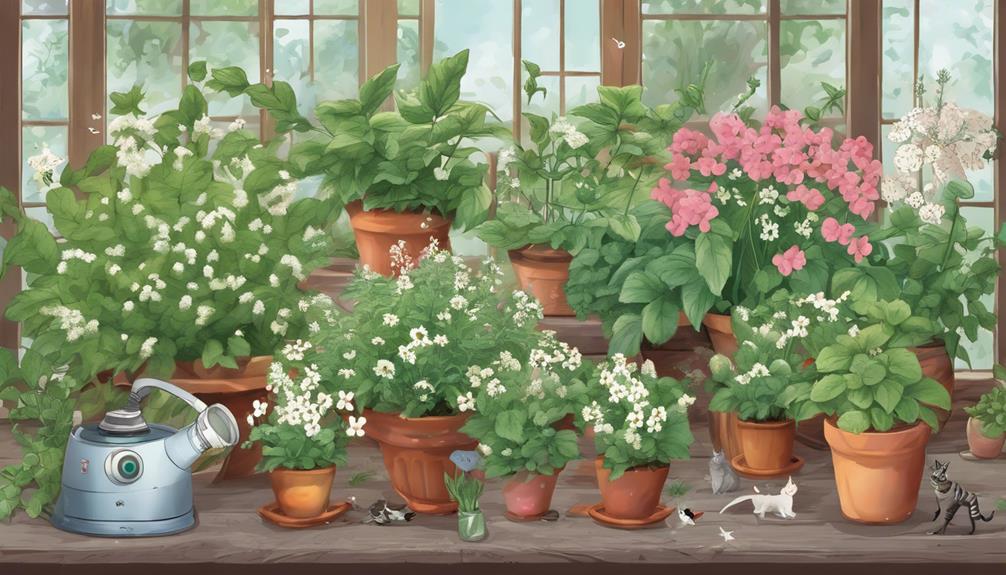
Consider adding catnip to your indoor space as another effective natural mosquito repellent option. Catnip, a member of the mint family, contains a compound called nepetalactone that’s known for its strong mosquito-repelling properties.
Not only does catnip help in keeping mosquitoes at bay, but it also adds a refreshing touch to your indoor garden with its pleasant aroma.
Catnip is easy to grow indoors, requiring minimal care and maintenance. Simply place it in a sunny spot and water it regularly. You can even crush the leaves to release more of the nepetalactone scent and enhance its mosquito-repelling effect.
To maximize the mosquito-repelling benefits of catnip, consider placing it near windows or outdoor seating areas to create a natural barrier against these pesky insects. Additionally, catnip can also attract beneficial insects like bees and butterflies to your indoor garden, making it a multifunctional plant to have around.
Incorporating catnip into your indoor plant collection not only adds greenery and freshness to your space but also helps in naturally repelling mosquitoes, making it a valuable addition to your home.
Frequently Asked Questions
Can These Plants Be Grown Indoors All Year Round?
You’ll be glad to know that these plants can thrive indoors year-round. They provide a natural way to keep mosquitoes at bay while adding greenery to your space. Enjoy their benefits without worrying about seasonal changes.
Do These Plants Require a Lot of Maintenance?
Maintaining these plants doesn’t require much effort. Regular watering, occasional pruning, and some sunlight are usually all that’s needed. With minimal care, you can enjoy their mosquito-repelling benefits indoors all year round.
Are These Plants Safe for Pets to Be Around?
Around pets, these plants are generally safe. However, some can be toxic if ingested. Ensure you research each plant before bringing them into your home. A little precaution goes a long way in keeping your furry friends safe.
How Effective Are These Plants at Repelling Mosquitoes?
To repel mosquitoes effectively, these plants emit scents that deter pests. They work best in confined spaces. Place them strategically indoors for optimal results. Enjoy a naturally bug-free environment with these green allies.
Can These Plants Be Used in Cooking or for Other Purposes?
You can use these plants in cooking and for various purposes. Incorporate them into recipes or DIY projects. Just ensure you are familiar with each plant’s properties before use. Enjoy their mosquito-repelling benefits in creative ways!
Content are generated with AI, fact checked by editorial team.
Hi there! My name is Aaron and I am a gardening expert from the United States. I have always had a passion for gardening and have been practicing it for years. I have gained extensive knowledge and experience in gardening.






